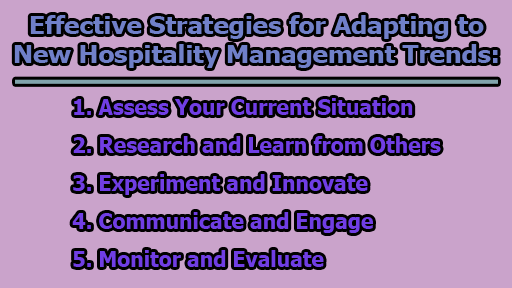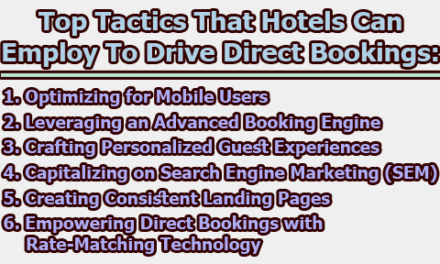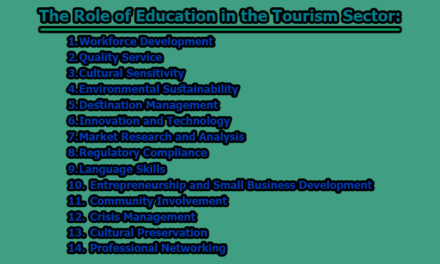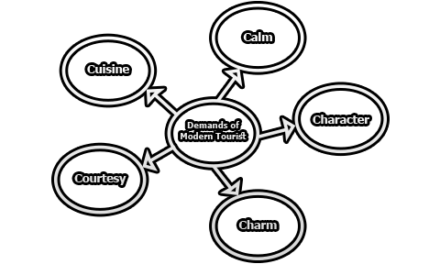Effective Strategies for Adapting to New Hospitality Management Trends:
The hospitality industry is dynamic and constantly evolving, with trends and consumer preferences shaping the way businesses operate. To stay ahead in this competitive landscape, hospitality managers must be agile and adept at adapting to new trends. In this article, we will delve into effective strategies for adapting to new hospitality management trends, focusing on five key pillars: assessing your current situation, researching and learning from others, experimenting and innovating, communicating and engaging, and monitoring and evaluating.
1. Assess Your Current Situation: Before embarking on the journey of adaptation, it’s crucial to have a clear understanding of your current position. Conduct a comprehensive assessment of your business, analyzing strengths, weaknesses, opportunities, and threats. This involves evaluating your existing processes, technology infrastructure, staff capabilities, and customer feedback.
1.1 Internal Assessment:
- Evaluate operational efficiency: Identify areas where operational processes can be streamlined and optimized for better efficiency.
- Workforce capabilities: Assess the skills and knowledge of your team, identifying gaps that may hinder adaptation to new trends.
- Technology audit: Examine your current technology infrastructure, ensuring it aligns with the latest industry standards.
1.2 External Assessment:
- Market analysis: Understand current market trends and consumer preferences. Analyze competitors to identify successful strategies and areas for improvement.
- Customer feedback: Utilize customer reviews and feedback to identify pain points and areas where improvements are needed.
2. Research and Learn from Others: In the ever-evolving landscape of hospitality, learning from the experiences and successes of others is invaluable. Conduct thorough research to stay informed about emerging trends, industry best practices, and successful case studies.
2.1 Industry Publications and Reports:
- Subscribe to industry publications, blogs, and reports to stay updated on the latest trends and market insights.
- Participate in conferences and events: Attend industry conferences and events to network with peers, gain insights from thought leaders, and stay abreast of industry developments.
2.2 Case Studies: Analyze case studies of successful adaptations within the hospitality sector. Understand the strategies employed and lessons learned by other businesses.
3. Experiment and Innovate: Innovation is at the heart of successful adaptation. Encourage a culture of experimentation within your organization, fostering creativity and a willingness to explore new ideas.
3.1 Pilot Programs:
- Implement small-scale pilot programs to test new strategies before full-scale implementation.
- Encourage feedback: Gather input from staff and customers during pilot programs to identify areas for improvement.
3.2 Embrace Technology:
- Explore innovative technologies that can enhance guest experiences, streamline operations, and improve overall efficiency.
- Invest in staff training to ensure a smooth transition to new technologies.
4. Communicate and Engage: Effective communication is essential throughout the adaptation process. Keep all stakeholders informed and engaged to build a sense of unity and purpose.
4.1 Internal Communication:
- Clearly communicate changes to staff, providing training and support as needed.
- Foster a culture of open communication, encouraging staff to share insights and concerns.
4.2 External Communication:
- Transparently communicate changes to customers through various channels, such as social media, newsletters, and on-site signage.
- Solicit customer feedback and use it to make adjustments as needed.
5. Monitor and Evaluate: Continuous monitoring and evaluation are crucial to ensuring the success of your adaptation efforts. Regularly assess the impact of changes and be prepared to make adjustments as necessary.
5.1 Key Performance Indicators (KPIs):
- Define and monitor KPIs that align with your business goals and the specific trends you are adapting to.
- Regularly review financial performance, customer satisfaction, and operational efficiency.
5.2 Feedback Loops:
- Establish feedback loops with staff and customers to gather real-time insights.
- Use feedback to make data-driven decisions and refine strategies over time.
In conclusion, adapting to new hospitality management trends is a continuous journey that requires a proactive and strategic approach. By assessing your current situation, learning from others, experimenting and innovating, communicating and engaging, and monitoring and evaluating, you can position your hospitality business for sustained success in an ever-changing industry. Embrace the challenges, stay informed, and foster a culture of adaptability to thrive in the dynamic world of hospitality.

Library Lecturer at Nurul Amin Degree College










